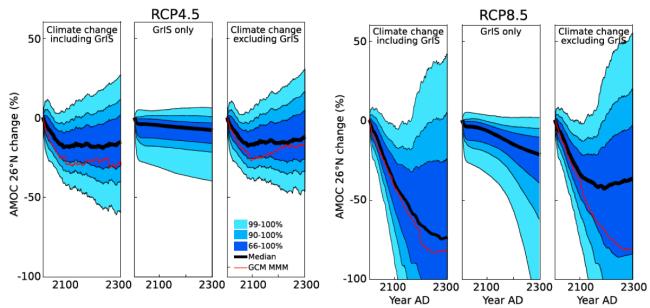Global warming and Greenland melting affects Atlantic overturning
Changes of the Atlantic Meridional Overturning Circulation (AMOC) strongly influence the distributions of heat, nutrients, and carbon in the ocean, thus affecting global climate, ecosystems, and biogeochemical cycles. Previous projections, including those used for recent international assessment reports, indicate an AMOC slowdown due to anthropogenic warming. But those projections were based on climate model simulations that did not consider melting of the Greenland Ice Sheet and may, therefore, be too conservative. A new study published in Geophysical Research Letters has organized a Model Intercomparison Project (AMOCMIP) in order to realistically consider Greenland Ice Sheet melting in state-of-the-science global climate model projections.

Eight modeling groups from around the world participated in AMOCMIP and conducted experiments with and without Greenland Ice Sheet melting. The results, shown as the red lines in the figure, were used to calibrate a box model of the AMOC. Probabilistic projections with the box model allowed consideration of all major uncertainties, such as modeled temperature sensitivities to CO2 concentrations, Greenland Ice Sheet melt sensitivities to temperature changes, and AMOC sensitivities to both temperature and Greenland Ice Sheet melt changes. The results show that the AMOC is more sensitive to warming, including changes in the atmospheric hydrological cycle, than Greenland Ice Sheet melting. However, Greenland Ice Sheet melt further increases the projected AMOC weakening.
The AMOC is very sensitive to different greenhouse gas emission scenarios. For the moderate representation concentration pathway (RCP) 4.5 scenario, it reduces in strength during the 21st century and stabilizes thereafter. And for the high RCP8.5 scenario, it continues to decline throughout the 22nd and 23rd centuries with a considerable probability of collapse (indicated as a 90% reduction). This suggests that reducing greenhouse gas emissions can avoid an AMOC collapse in the future.
Fate of the Atlantic Meridional Overturning Circulation: Strong decline under continued warming and Greenland melting (Geophysical Research Letters)
1Oregon State University
2Now at MARUM, University of Bremen, Germany
3Utrecht University, Netherlands
4University of Tokyo, Japan
5CSIRO Oceans and Atmosphere, Victoria, Australia
6National Center for Atmospheric Research
7University of Arizona
8Sogn og Fjordane University College, Norway
9Universidad de Magallanes, Chile
10Canadian Centre for Climate Modeling & Analysis, Canada
11Institut Pierre-Simon Laplace, France
Topics
- Modeling
- Atlantic Ocean
- Climate Change
- AMOC
